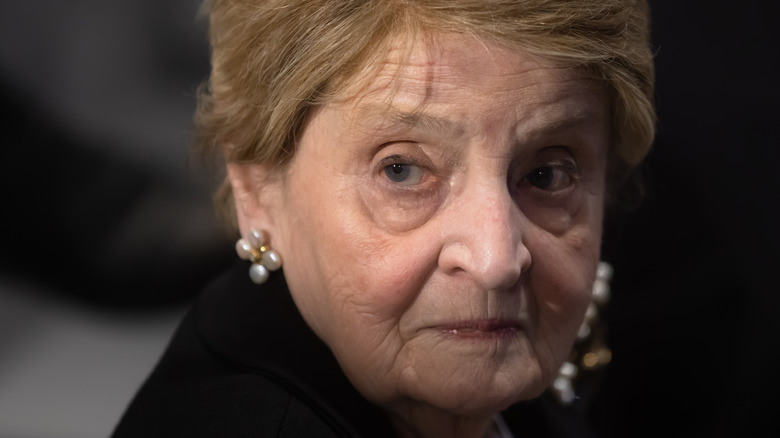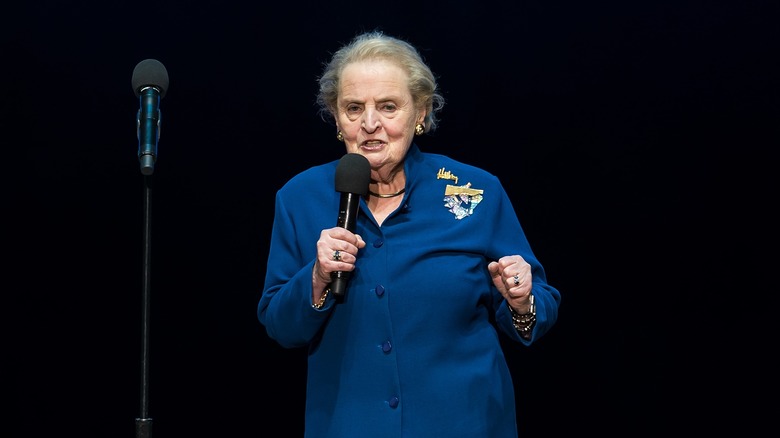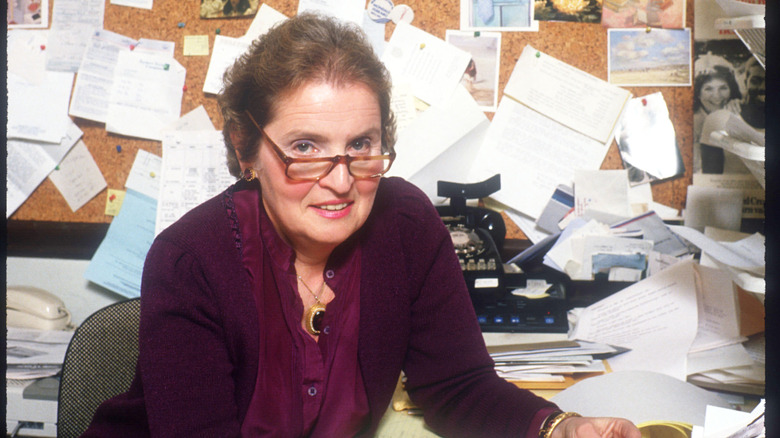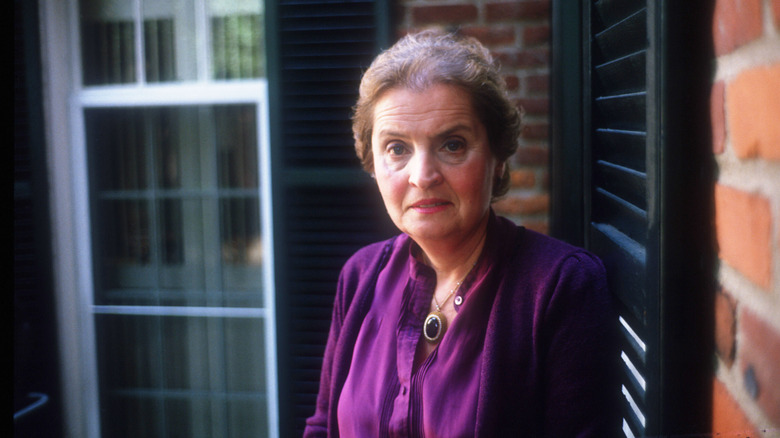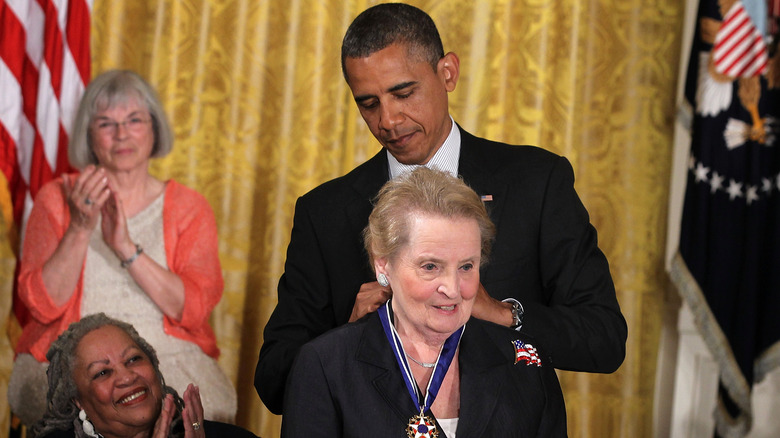The Heart-Wrenching Death Of Madeleine Albright
Madeleine Albright was the first woman selected to serve as the United States Secretary of State and played a key role in foreign policies at the end of the Cold War.
According to ABC News, on March 23, 2022, it was announced via email to Albright Stonebridge Group, a global strategic advisory and commercial diplomacy firm that Albright had founded and for which she served as the organization's chair, that the former Secretary of State had died at the age of 84.
Albright was a major and well-respected figure in United States foreign policy circles, especially in the 1990s when she was the country's ambassador to the United Nations and eventually Secretary of State, a position she was appointed to by President Bill Clinton (via Britannica). In her role as Secretary of State, Albright was integral in pushes to defend democracy and human rights, including efforts to stop ethnic cleansing in Yugoslavia in the late '90s and she even visited North Korea — becoming the highest-ranking United States official to ever do so — while trying to put an end to that country's nuclear weapons program.
Albright's early life
According to the U.S. Department of State, Madeleine Albright was born Marie Jean "Madlenka" Korbel on May 15, 1937, in Prague, Czechoslovakia. Her father worked in government and was a member of the Czechoslovak Foreign Service and worked as a diplomat.
In 1939, when Albright was just 2 years old, her family fled Czechoslovakia and made their way to England as the Nazis began taking over large portions of eastern Europe in the lead up to World War II. According to Britannica, for a large portion of her life, it was Albright's understanding that this decision was made for political reasons. However, in 1997 she learned that the reality of the situation was that her family was Jewish and that three of her grandparents had been killed in German concentration camps.
Her family attempted to return to their home country at the conclusion of World War II, but at that point, the Soviet Union had backed communists there who were in control of Czechoslovakia following a coup. They were forced to flee once again, but this time they headed for the United States.
Madeleine Albright's early career
Upon arriving in the United States, Albright's family settled in Denver Colorado. She eventually Americanized her name and became a United States citizen in 1957, per the U.S. Department of State. In 1959, Albright graduated from Wellesley College in Massachusetts where she received a B.A. in political science. Albright later went on to further her education at Columbia University where she received a master's degree in 1968 and a Ph.D. in Public Law and Government in 1976 (via Britannica).
The same year she graduated from Wellesley College she married her husband Joseph Albright, whose family was in the newspaper business.
Albright worked as a fundraiser for Senator Edmund Muskie's presidential campaign during the 1972 Democratic primary election. While Muskie started as one of the early favorites, he failed to secure the party's nomination which instead went to George McGovern, who went on to suffer a landslide loss to Richard Nixon (via Britannica). However, Albright's time with Muskie led to her being named his chief legislative assistant.
Moving into the White House
Albright worked for Muskie as his chief legislative assistant from 1976 to 1978, according to the U.S. Department of State. She moved on to work as a staff member in the White House in 1978 under President Jimmy Carter and was also on the National Security Council under National Security Adviser Zbigniew Brzezinski.
She left the White House along with the rest of the Carter Administration in 1981, and two years later she was appointed Research Professor of International Affairs at Georgetown University's School of Foreign Service and Director of its Women in Foreign Service Program.
Additionally, during both the Reagan and Bush administrations, Albright worked for non-profit organizations and her house became a salon that played host to Democratic politicians and other political figures (via Britannica).
The Democrats regained control of the White House after Bill Clinton won the 1992 presidential election, and in 1993 she jumped back into politics.
United Nations Ambassador and Secretary of State
In 1993, President Clinton appointed Albright as the United States' Ambassador to the United Nations. According to Britannica, During her time at the United Nations, Albright was known for her tough approach to diplomatic matters and is also credited with being one of the driving forces behind greater United States involvement in the United Nations.
She served in that capacity until in she was appointed as the new Secretary of State following President Clinton's victory in the 1996 presidential election, and she was confirmed by the Senate and sworn in early in Clinton's second term. According to the U.S. Department of State is perhaps best remembered for her time as Secretary of State for her efforts to expand NATO's reach farther east into what had previously been Soviet bloc countries. She is also known to have fought hard in instances wherever democracy or human rights were threatened.
Madeleine Albright dies at 84
Albright left the White House at the end of Bill Clinton's second term and started the Albright Stonebridge Group. She made occasional forays back into politics over the years, most notably in both 2008 and 2016 where she supported fellow Secretary of State Hillary Clinton's presidential bids (via Britannica).
Albright continued to write columns on foreign affairs, was a member of the Council on Foreign Relations, and also penned several books. In 2012, she was honored with the Presidential Medal of Freedom, awarded to her by President Barack Obama.
Albright was a trailblazer and set an example for women who wished to pursue high-ranking roles in government. "I think that there were real questions as to ... whether a woman could be secretary of state. And not just in terms of dealing with the issues, but in terms of dealing with the people, especially in hierarchical societies. ... I found, actually, that I could do that," she said to CNN in 2005.
Right up to her death, Albright was vocal when it came to foreign policy, just a few weeks before her death at age 84, she wrote an op-ed piece for The New York Times, in which she discussed Vladimir Putin's invasion of Ukraine.
"Instead of paving Russia's path to greatness, invading Ukraine would ensure Mr. Putin's infamy by leaving his country diplomatically isolated, economically crippled, and strategically vulnerable in the face of a stronger, more united Western alliance," she wrote.
